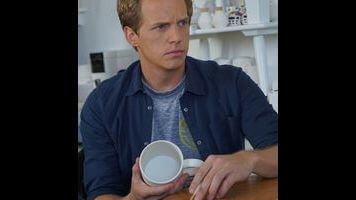An emotionally exaggerated You’re The Worst spins its wheels

As anyone with an awareness of television formulas already knows, sitcom characters can’t really change all that much from week to week, or really, over the entire course of the series. Even in these Golden Age/Peak times, television relies on stasis and consistency in order to maintain viewership. Audiences return to a show weekly largely because they know they’re going to get X when they tune in, not Y. Yet, this doesn’t have to be an inherently limiting factor, and many popular, acclaimed shows have built this idea into the series’ development. Take You’re The Worst, a show about two narcissists in a relationship that’s also about the slow process of maturation. It’s a given that Jimmy and Gretchen aren’t going to magically become different people at the end of an episode or season. Instead, Falk and co. illustrate how people who have developed also take steps backwards, regress back into old habits, and cruelly lash out at others. Awareness is only the first step, but sustained positive action is a lifetime’s work.
But it doesn’t make it any less frustrating to watch. In the first part of this season, Jimmy and Gretchen have returned to a state of normalcy, i.e. constantly drunk and emotionally closed off, after Gretchen’s spiral last year. The two are arguably closer than ever, but they are also at their most insufferable. In “Men Get Strong,” Gretchen tries to get Jimmy to actually experience grief for his father’s death, mostly because she doesn’t want it to bubble up on their “rad cruise,” so they embark on a “sadness” journey that largely involves them avoiding the issue. They go to a funeral, but they end up getting aroused and having sex at the graveyard. They go to a Make-Your-Own-Pottery place with fathers and sons only to see an abominable child bully his dad. They go to a British-themed bar where Gretchen dresses up like Jimmy’s father and berates Jimmy, and the only reaction she gets out of him is a fart.
This is standard You’re The Worst material, but at this point in the game, it’s become a bit of a one-note chore watching Jimmy and Gretchen act this obliviously obnoxious, especially when we’ve already seen them as nuanced, vulnerable human beings. Sure, Jimmy’s cold reaction to his father’s death falls in line with the character and his strained familial relationships, and yet it feels too exaggerated in “Men Get Strong” for much of the emotional content to land, especially when the audience is aware of the self-delusion on display. Credited writer Alison Bennett and Falk certainly have legitimate creative reasons for these characterizations—it opens the show up comedically, damaged human beings relapse back into old tendencies all time, core traits never change, etc.—and yet sometimes it can’t help but feel like the series is stuck in neutral as opposed to the characters.
Some of this has to do with the high bar established by the series’ second season, but some of it also has to do with the macro-plotting this year, which essentially amounts to tiny crumbs of foreshadowing. The obvious one is Edgar, whom everyone on the show uniformly treats like utter shit to the point where it has stopped becoming a joke and more of a cringe-worthy recurrence. In the episode, Jimmy and Gretchen bully Edgar into driving them around and treat him like the worst Uber driver imaginable, complete with Jimmy texting him ratings. Of course, they’re unaware that he skipped his VA appointment to get drunk alone, and that he lies about his car breaking down so he doesn’t have to see them again. Near the end, Gretchen makes a tiny effort to get him to open up, but when he declines, she’s openly relieved not to have to deal with his trauma. You’re The Worst in part has become a waiting game to see if someone will actually notice Edgar’s pain before or after he falls of the proverbial cliff. Again, there are legitimate reasons why Jimmy and Gretchen wouldn’t see Edgar’s mental anguish, mainly because people miss warning signs in others all the time, but it’s still a slog to have to wait before the inevitable shoe drops.































![Rob Reiner's son booked for murder amid homicide investigation [Updated]](https://img.pastemagazine.com/wp-content/avuploads/2025/12/15131025/MixCollage-15-Dec-2025-01-10-PM-9121.jpg)








